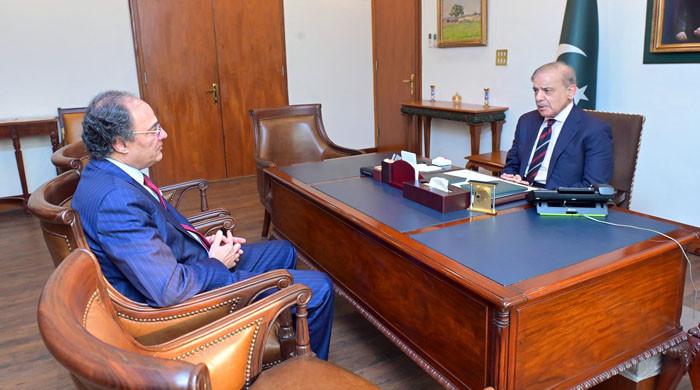Pakistan ‘striving’ to meet IMF terms amid resistance to tax reforms
2024-09-03 14:33:00
Hoping that Pakistan will no longer have to rely on the lender of last resort for external funding in the future, Prime Minister Shehbaz Sharif has said that the government is actively taking measures to meet the International Monetary Fund’s (IMF) terms and conditions to finalise the $7 billion loan programme.
Pakistan and the IMF reached an agreement on the 37-month loan programme in July. The IMF has said the programme was subject to approval from its executive board and obtaining “timely confirmation of necessary financing assurances from Pakistan’s development and bilateral partners”.
“Once the IMF board approves the programme, we will enter a new phase,” the premier said, according to Reuters on Tuesday, adding, “Working on implementing all conditions for IMF programme.”
Moody’s, which upgraded Pakistan’s rating to Caa2 last week, citing increased certainty on external financing after the IMF staff-level pact, expects IMF board approval for the loan programme within weeks.
However, Pakistan’s loan approval is not included in the IMF Executive Board’s latest meeting agenda, which raises concerns as this loan deal is crucial for stabilising the country’s struggling economy.
On the other hand, the government is optimistic that the country will secure approval for a $7 billion bailout package from the IMF next month.
Meanwhile, in a televised address today, Federal Minister for Finance and Revenue, Senator Muhammad Aurangzeb, stated that Pakistan had already signed a Staff Level Agreement (SLA) with the IMF and was in the advanced stages of securing the agreement’s approval by the IMF executive board.
While sharing the Prime Minister’s hopes that this will be the last IMF programme, Aurangzeb warned that it would depend on structural reforms and the country becoming self-sufficient.
The finance czar reaffirmed the government’s resolve to carry forward the reforms agenda, aiming at broadening the tax base and rightsizing the federal government to achieve macroeconomic stability what he called “basic hygiene” for sustainable growth.
He vowed to persevere with plans for new taxes on the retail sector despite strike threats, as a step towards winning approval from the board of the International Monetary Fund (IMF) for the loan.
The taxes, in line with ambitious revenue targets adopted to clinch a staff-level deal on the 37-month IMF programme, faced public backlash after they were introduced in the June budget.
“One thing I want to be very clear (about) … This is not going to be taken back,” Finance Minister Muhammad Aurangzeb said in a televised speech that urged wholesalers, distributors and retailers to contribute to the economy.
The comments follow a nationwide strike by retailers last week to demand the withdrawal of the new tax scheme and high electricity rates, the latest of the last few months protests against the new tariffs, taxes and inflation.
Although Muhammad Sharjeel Goplani, chairman of a group of traders, the All-City Tajir Ittehad Association, had threatened an indefinite strike if the demand was not met, no further action has been announced since.
The Fund’s board approval hinges on confirmation of financing assurances for Pakistan from development and bilateral partners.
Local media reported the approval was delayed by a lack of additional financing and unpaid energy sector subsidies announced by the eastern province of Punjab and the federal government.
In a statement, Punjab’s information minister, Azma Bukhari, said the federal government and the IMF had not contacted the province about an electricity subsidy and the Fund had not released any written statement.
The IMF, the finance ministry and the power ministry did not immediately respond to a request for comment.
Reining in unresolved debt across Pakistan’s power sector is a top concern of the IMF, which ended a $3-billion bailout in April that led to higher tariffs, hurting the poor and middle class, and cut household use for the first time in 16 years.
Source link
www.thenews.com.pk
#Pakistan #striving #meet #IMF #terms #resistance #tax #reforms





